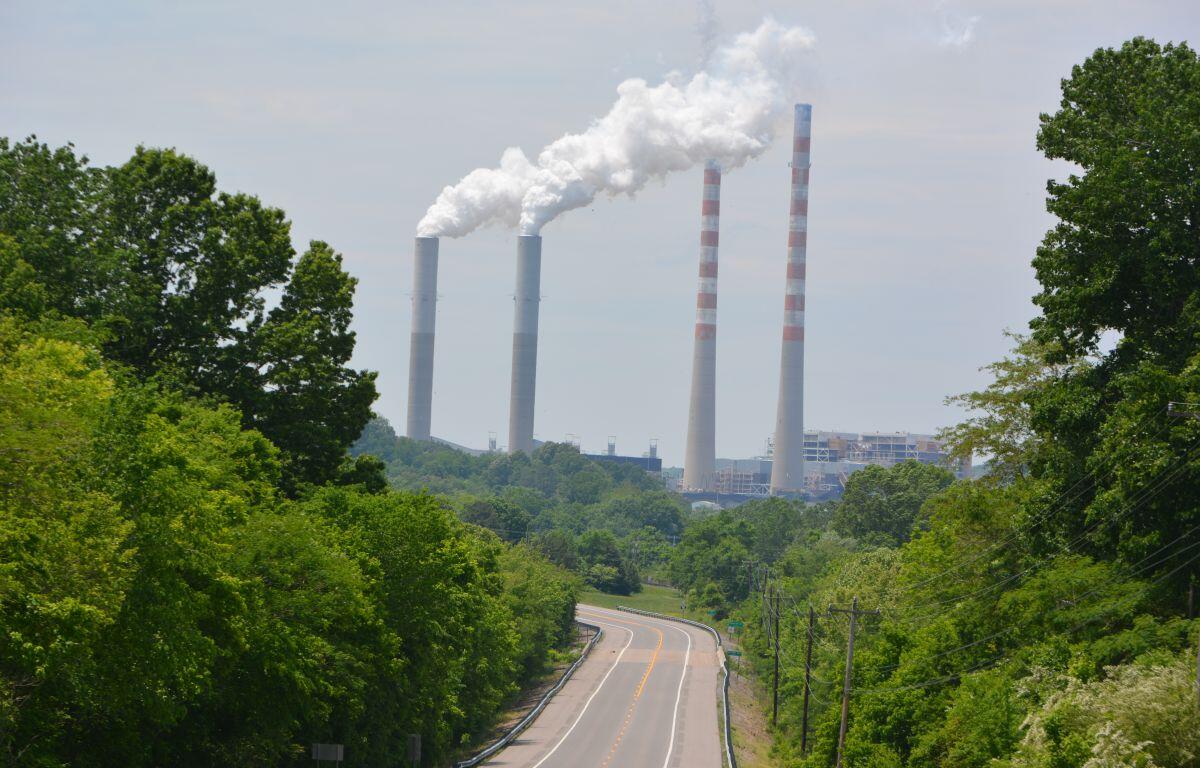CLARKSVILLE, TN (CLARKSVILLE NOW) – The Tennessee Valley Authority is moving forward with a plan to retire and demolish its high-pollutant two-unit, coal-fired Cumberland Fossil Plant and replace it with a natural gas-fueled combined cycle combustion turbine.
In May 2021, the TVA announced it was taking steps toward closing and possibly replacing the plant, located in Stewart County just over the Montgomery County line. After analyzing options and gathering public input, TVA will move forward with its plan to decommission the two coal-fired units, one unit by the end of 2026 and the other by the end of 2028.

Why gas and not solar?
Two other options were considered before the company moved forward with the decision, according to a previous news release. The other options were simple cycle combustion turbine gas plants at alternate locations and solar and storage facilities, primarily at alternate locations.
TVA identified the gas-fueled combined cycle combustion turbine operation at Cumberland City as the best option.
“This was largely due to Alternative A best meeting the purpose and need of the proposed action, particularly its ability to provide replacement generation that can supply 1,450 (megawatts) of firm, dispatchable power by the time the first (coal-fired) unit is retired by the end of 2026,” the release said.
That’s just over half of the power the 2,500 megawatts the fossil plant currently produces, but TVA plans to integrate 10,000 megawatts of solar onto the system by 2035.
According to the notice, the plan will allow TVA to replace the dependable capacity of the first unit while also accounting for minor anticipated load increases. Unlike the other options, it would also be completed sooner than 2026 and take up much less acreage. In the case of solar energy, that plan alone would have required around 22,000 acres.
“The (gas-fueled) plant and associated 500-kilovolt switchyard and gas compression station would occupy approximately 196 acres. The 30-inch-diameter gas pipeline to supply natural gas to the (gas-fueled) plant would be constructed and operated by Tennessee Gas Pipeline Company in a 100-foot-wide corridor adjacent to an existing TVA transmission line crossing portions of Dickson, Houston and Stewart Counties, Tennessee,” the release said.
The 32-mile pipeline requires approval by the Federal Energy Regulatory Commission through the issuance of a Certificate of Public Convenience and Necessity under Section 7 of the Natural Gas Act. TGP has submitted that application for certification.

Environmental groups object
The Clean Up TVA Coalition has spoken out against the plans, expressing concern about recent rolling blackouts for millions of customers caused by several coal and gas plants going offline during the record-breaking winter storm Elliot.
“Energy Information Administration data shows solar energy helped prevent more serious power outages over the holidays,” the coalition said in a news release. “TVA currently produces less than 3% of its energy from wind and solar. The federal utility’s environmental review for the Cumberland Plant has attracted significant attention, with concerns raised in comments by the Environmental Protection Agency, environmental organizations, local power companies, elected officials and over a thousand private citizens.”
Members of the coalition are actively speaking out against the pipeline.
“TVA was unprepared for the storm, even though the TVA Board commented last May that extreme weather events are no longer anomalies and so urged for examination of their own system resiliency,” said JoAnn McIntosh, a volunteer with Sierra Club. “The proposed gas build-out at Cumberland, near my home, is yet another example that TVA has not connected the dots between the negative impact of their own fossil fuel emissions on their ability to serve Tennessee residents.”
“This is a reckless decision that will have devastating impacts on our region,” said Bri Knisley, Tennessee campaign manager for Appalachian Voices. “Families in the Tennessee Valley just suffered a summer of substantially higher electricity bills that were a direct result of TVA’s increased gas costs. This Christmas, households lost electricity because TVA’s gas and coal plants couldn’t produce. Who is holding TVA accountable?”
The Clean Up TVA coalition has launched three billboards in Chattanooga and Knoxville that read: “Blackouts. TVA Fossil Plants Failed. Time for Something New.”
It also directs viewers to an action page encouraging the public to urge TVA board members and CEO Lyash to invest in renewable energy instead of fossil fuels such as those used at the Cumberland site.
About the steam plant
The Cumberland Fossil Plant, commonly called the “steam plant,” was built in 1972 on the Cumberland River in Cumberland City, about 25 miles southwest of Clarksville on Highway 149, and has employed as many as 400 people, according to previous reports. It produces almost 2,500 megawatts of power, making it more powerful than even some nuclear plants.
But that power has come at a price in pollution. In 2016, the Cumberland Fossil Plant ranked as the No. 3 air polluter in the nation, with a combination of greenhouse gases and Toxics Release Inventory emissions, and the worst mercury polluter in the country among coal-fired power plants, according to The Leaf-Chronicle archives.
The Cumberland Fossil Plant far outweighs other Clarksville-area industries in pollutants, according to a 2018 Leaf-Chronicle analysis. Several industries generate in the thousands or tens of thousands of pounds in air pollutants annually. Nyrstar Zinc ranks well above those, with 234,000 pounds of toxic air pollutants in 2017. That same year, the Cumberland Fossil Plant produced 10 times that amount at 2.5 million pounds of air pollutants.
Chris Smith contributed to this report.


